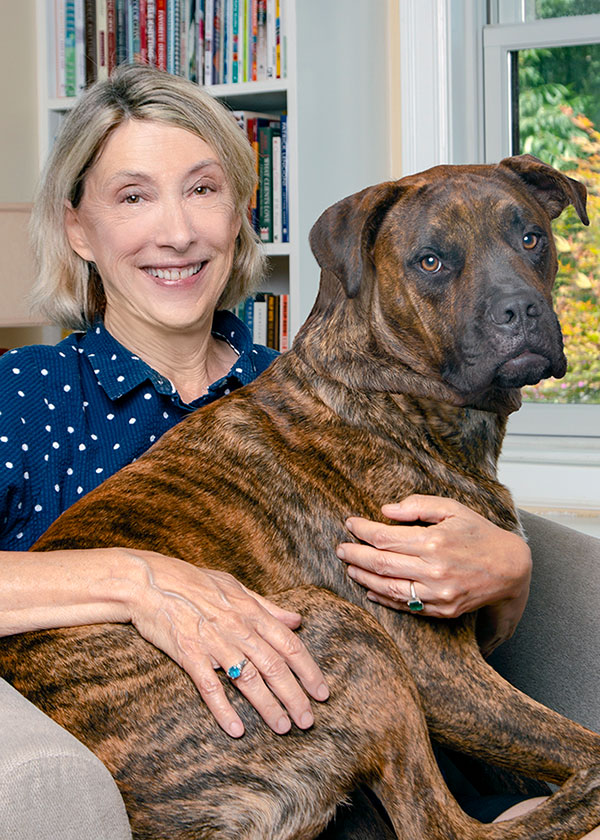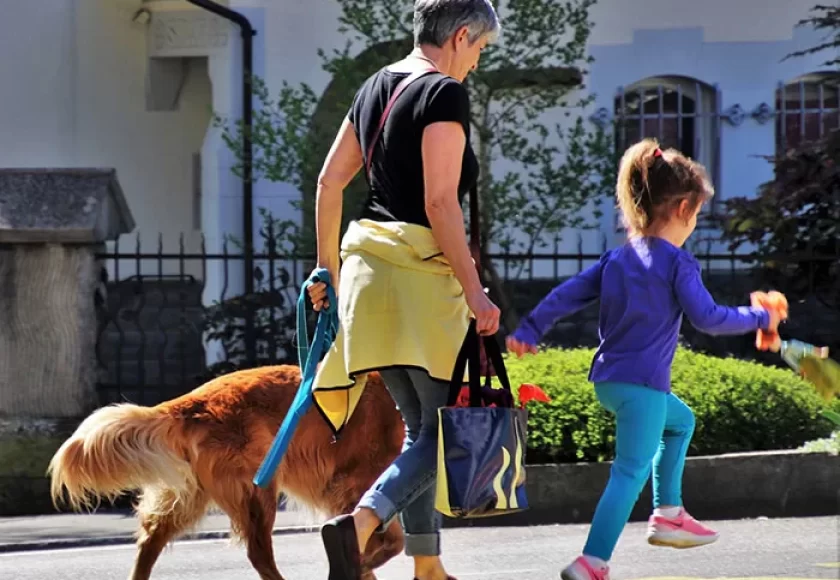When you choose to foster a service dog as a volunteer puppy raiser, you’re making a huge commitment to the puppy, the organization you work with, and the eventual recipient of the dog. Service dog puppy fostering comes with a lot of responsibility, but working with a reputable organization and credible trainer can help guide you and the puppy to success.
Putnam Service Dogs relies on puppy foster volunteers to raise sociable and obedient service animals for a wide range of people with physical disabilities other than blindness, and veterans with PTSD. The demand for their service dogs is overwhelming. You will be contributing to a valued cause! Before submitting your application, be sure to consider what preparing for a service dog puppy really means.
Understanding the Heart Required for Fostering a Puppy
Fostering a puppy who will become a service dog looks much different from fostering a pet. Fostering a pet with the goal of finding him or her a permanent home is admirable and noble, but service dog raising comes with far more commitment. Not only are you giving a dog a life filled with love, but you’re also changing lives for the better. Service dogs offer individuals with disabilities economic, psychological, and social benefits, and in most cases, they lead to a dramatic quality of life improvement.
Know What to Expect as a Puppy Foster
Puppies are adorable and fun, but at the same time, fostering a service dog requires work. Obedience and potty training can be challenging in the beginning, even for the most seasoned trainers, which can lead to feelings of frustration. However, you can also look forward to seeing a puppy experience snow for the first time, learning new commands, and developing a priceless bond with you.
Fostering a puppy for an individual with disabilities is a mix of ups and downs, but finding an excellent organization that offers a sense of community offers incredible support that many puppy fosters come to rely on.
What to Expect from a Service Dog Puppy
Whether pets or eventual service dogs, all dogs go through the puppy phase. They are adorable and bring joy to their fosters’ lives, but there are several things to keep in mind.
- Anxiety: Putnam Service Dogs adopts carefully selected mixed breed rescue dogs to train as their service dogs. Transitioning a puppy from shelter life to home life improves the dog’s quality of life, but it is not without its troubles. Some puppies feel anxiety when they are introduced to a new living environment, and start crate training. It is important to allow the puppy to explore his or her boundaries and take the time required to acclimate to the new surroundings.
- Potty Training: Like children, all puppies are different when it comes to potty training. Some puppies seem to take to it right away, but others require a little more time and work. Puppies must be taken outside frequently at first – often every hour or two – until they catch on. It isn’t unusual for puppy fosters to wake up during the night for the first few weeks for potty breaks. A young dog can’t physically hold it for long. A three month old dog, during the day, can physically hold it for only 2 hours — even when it understands it’s best to eliminate outside. Many young dogs can sleep through the night after their initial period of adjustment to their new home.
- Socialization: Putnam Service Dogs seeks pups who are friendly, and confident. When fostering a service dog puppy, socialization is one of the most important goals. Introducing the puppy to new situations and people. Socialization must be done very carefully, small steps at first when the pup is young, building to higher stress situations for longer periods. Improper socialization can permanently mar the success of a dog, so you need to listen to the guidance of a service dog trainer carefully.
- Disobedience: Puppies are not purposely disobedient. They are simply unaware of what is expected of them. Time, patience, love, and consistency will eventually help a foster puppy become loyal and obedient.
Working with a Credible Trainer and Service Dog Organization
Participating in a community is one of the most important things you can do when fostering a puppy. From providing you with the right puppy to foster to supporting you when the time to transition the dog to a recipient draws near, the right community can make for a more fulfilling experience. Look for an organization that places the puppy’s wellbeing at the top of the priority list, offers exceptional support, provides access to a credible, skilled trainer, and offers material support when required.
Practical Steps to Prepare for Fostering a Puppy
Before deciding to foster a service dog, follow these five practical steps to ensure an all-around positive experience for your puppy and yourself.
Step 1: Ready Yourself for the Commitment
Before you apply to become a volunteer puppy foster, take some time to think about the commitment involved. If possible, reach out to a service dog puppy fostering community to ask questions or talk about your concerns. You will commit to six to 18 months of puppy raising along with all its challenges and joys. To fulfill the caring, exercising, training, socializing, and loving (building a close relationship), expect to spend 1-2 hours a day raising a service dog pup.
Step 2: Submit an Application
When you choose an organization, be sure to read over the requirements for becoming a volunteer puppy foster. Every organization has different qualifications, but some of the most common requirements include:
- Residing in a specific geographical location in close proximity to the organization, its trainers, and its chosen veterinary team.
- Not leaving the pup alone for more than 1-2 hours/day.
- Owning a maximum of only one other friendly or non-aggressive dog.
- Walking the dog at least one mile each day.
- Remaining kind and patient for a term of six to 18 months.
- Desiring to make a significant contribution to improving the lives of individuals with disabilities.
Step 3: Prepare Your Home and Yard
Puppies are very curious by nature, which means you will need to spend some time “puppy-proofing” your home and yard. A physically fenced yard is ideal to keep the pup safe, allow it room to run every day and get the zoomies out. A well exercised pup is a happy pup, and a pup who learns well. Potential fosters should make sure that potentially toxic items like chemicals and certain houseplants are out of the puppy’s reach. Puppy fosters should also provide a safe, comfortable sleeping environment. Until a pup is house trained, you should limit its access to a smaller area in the house where you can easily keep eyes on the pup at all times. An unsupervised pup can easily get into trouble — from finding a private spot to soil in the house, to chewing on unwanted items.
Step 4: Purchase Food and Supplies
Depending on the organization you work with as a puppy foster, you may be provided with some food and supplies like a crate, toys, leashes, harnesses, vet care, and even a puppy bed. Some of the supplies you will need to purchase on your own include a measuring cup, a bin for food storage, additional toys, and the costs associated with transporting the dog to and from the groomer, vet, and trainer.
Look for quality food and supplies, such as Nature’s Select Premium Pet Food. Nature’s Select offers a wide range of protein options that are tasty and easily digestible, and ingredients like selenium yeast, pre- and probiotics, and complex minerals ensure your puppy is happy and healthy.
Step 5: Prioritize Your Schedule
Fostering a puppy is time-consuming, and much of your life will revolve around your puppy’s schedule. There are five focus areas that you should prioritize above all else:
- Puppy Care: Basic care includes giving the puppy food and water in clean bowls, keeping your home, or at least the pup’s area clean, and caring for medical needs.
- Exercise: Puppies should walk with their foster for at least one mile a day when they are six months of age and older, and they should have a safe, enclosed space to run for five to 10 minutes a day minimum.
- Love: Puppies need lots of love to build the bond required for loyal service. Cuddling, petting, and playing are all great ways to show your love and affection. You’ll be taught to keep the pup on a predictable schedule — the same every day — and to give the pup time alone in their crate to foster independence. While a very close bond is required between a service dog and its person, without sufficient independence, a service dog can become troublesome with too much separation anxiety.
- Training: Foster puppy training occurs in small snippets throughout the day. Training in 10 minute increments two or three times a day works with a puppy’s limited attention span.
- Socialization: Socialized puppies become confident service dogs, making socialization vital to the puppy’s success. A service dog in training is socialized much more than a pet dog is — to more new situations, people, dogs, etc. This allows a service dog to remain calm and unflappable when it’s out in public with its person.
Advantages of Fostering a Puppy through Putnam Service Dogs
As a volunteer puppy raiser, you will learn a LOT about dogs from your raising a service dog pup in training. You will spend a lot more time and effort than you would raising a pet dog. You get out of something what you put into it, and raising a service dog pup requires a lot of you. In return, you’ll see the pup emerge as an incredible dog because of your efforts. If the dog makes it all the way to graduation you’ll have the tremendous satisfaction of knowing you contributed to changing the life of both an unwanted rescue dog, and its person it is capably, lovingly assisting.
When you choose to work with Putnam Service Dogs, you are joining a caring community that is devoted to improving quality of life for their dogs, carefully chosen from area rescues, individuals with physical disabilities other than blindness, and veterans with PTSD. You’ll assist them in raising and training kind, confident, and loyal service dogs. Our experienced service dog trainers will guide you closely in your journey to help the pup achieve its best path — hopefully as a service dog.
Putnam Service Dogs strives to use only humane methods to gently, lovingly train their service dogs. We are passionate about raising the best possible service dogs by championing the nurturing bond between dogs and people. We offer comprehensive puppy fostering support from day one, ensuring that help or guidance is only a phone call or text away.
If you are ready to foster a puppy, consider changing your life, a puppy’s life, and the future recipient’s life by becoming a volunteer puppy raiser.
Sources:
- Service Dog Fostering – Joybound (formerly ARF)
- Fostering a Therapy Dog: A Guide to Giving Your Heart (rover.com)






